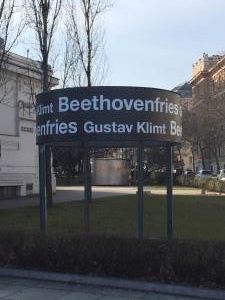As expected, the Austria’s Advisory Committee (Der Beirat gemäß § 3 des Bundesgesetzes über die Rückgabe von Kunstgegenständen aus den Österreichischen Bundesmuseen und Sammlungen, BGBl. I Nr. 181/1998 i.d.F. BGBl. I Nr. 117/2009, (Kunstrückgabegesetz)) issued a decision on Friday with respect to the Lederer family’s claim to the famous Beethoven Frieze. In a lengthy opinion, the Committee recommended against restitution, prompting widespread speculation about what the claimants would do next. The mural is installed at Vienna's iconic Secession Museum (my photograph of the museum exterior, taken today, is below), and is one of the icons of fin-de-siècle Vienna.
Austria’s immediate post-war restitution law provided for the return of artwork that had been stolen or taken under duress by the Nazis, but with a catch: certain artwork could not physically leave Austria. So, for a survivor living in Zurich, London or New York, this was of limited use. What it created, of course, was the opportunity for buyers to “take it off their hands,” and thus to create an inherently unfair and inequitable bargaining situation. In an op-ed right before the decision was issued, Jane Kallir of Galerie St. Etienne wrote persuasively about the extent to which the then-government used the law.
In the Lederer case, the frieze was actually formally restituted, but without an export license. According to the family, Austria would only grant an export license for the family’s other art if they agreed to sell the frieze to Austria at a bargain rate. Eventually, a sale was consummated in 1973 for $750,000, which the family asserts was a fraction of its value.
The Committee focused at length on the correspondence between the Lederer family and Austrian officials. Ultimately, the Committee was unpersuaded that the Austrian government had actually forbidden (as opposed to discouraged) the export of the painting. So, even though Austria revised its laws in 2009 (in addition to the 1998 amendments, to be more precise than my post last week) to recognize that the export prohibition could justify restitution, the Committee would not deem it to be sufficiently coercive to recommend restitution.
The claimants wasted little time in challenging the decision, and declaring it wrongly decided. Marc Weber, an attorney for some of the family, blasted the reasoning of the recommendation. Weber, an attorney in Zurich at Lanter Rechtsanwälte, issued a press release (available only in German as far as I know), declaring the case to be one for international courts. In the release, Weber questioned whether he and his clients had received all relevant documents, and went on (my translation):
We question whether something secretive may have happened. The Republic of Austria has delivered its verdict without giving those concerned a chance to review the files and give an opinion. The rules of the proceeding and the current execution of the Art Restitution Law violated several aspects of fundamental rights. We plan to ask the European Court of Human Rights in Strasbourg to review these severe legal defects. Moreover, we want to explore opportunities that are offered by U.S. jurisdiction.
Perhaps most interesting is that Weber specifically recited the prospect of U.S jurisdiction. It was, after all, a case against Austria that laid the questions to rest and paved the way for the Foreign Sovereign Immunities Act to provide jurisdiction in U.S. federal courts for restitution claims (such as the recent claims against Germany for the Welfenschatz). This story is almost certainly not over.





